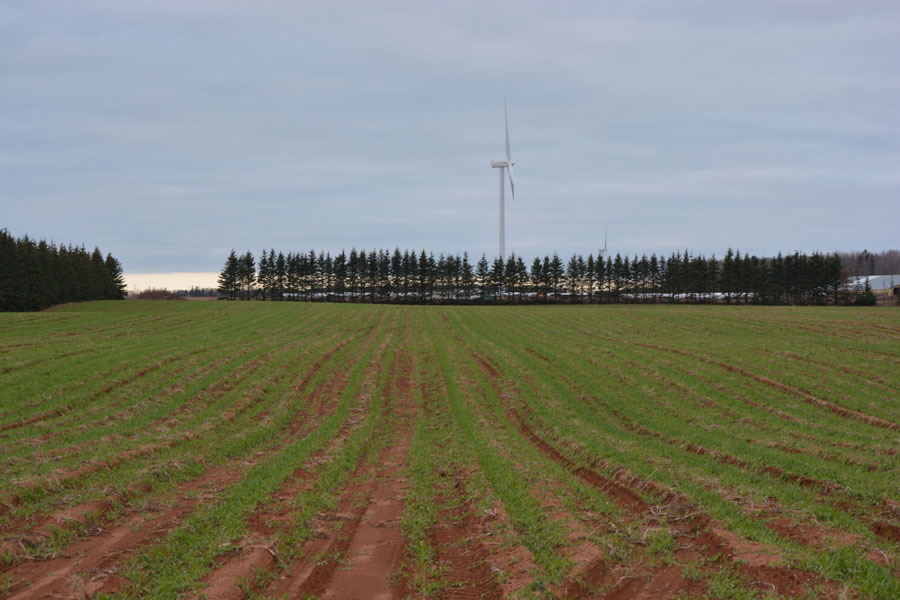Government program focuses on environment
Charles Murphy is no stranger to agriculture. For 50 years he has been growing seed potatoes, wheat, and non-GMO soybeans in China Point, east of Stratford.
Since the arrival of the first Murphy family ancestors from Ireland in the early 1800s, six generations have farmed this land. Charles and his wife, Wilhelmena, purchased the family farm in 1972. Their sons, Randy and Francis, have since become part of the family business. The grandchildren are poised to become the seventh generation to continue the family tradition.
He played a prominent role in developing the Alternative Land Use Services Program (ALUS) in PEI a decade ago, having served as a member of the program’s initial advisory committee in 2008.
“To my mind, there is a strong case for the ALUS program as the most innovative way to help reduce the footprint of modern agriculture on the natural environment. ALUS is certainly helping us do more for wildlife and the environment on our farm,” Charles Murphy said.
He is not surprised that PEI farmers have embraced the ALUS program given that “the provincial economic engine is agriculture. ALUS helps share some of the costs of environmental stewardship actions that farmers need to take for the good of the community.”
Specifically, ALUS helps the Murphys maintain nearly five acres of grassed waterways and other soil-conservation structures in fields to reduce soil erosion, as well as 52 acres of expanded buffer zones for wildlife habitat, far beyond the 15 metres required by provincial legislation.
One of these ALUS buffer zones serves to separate the working areas of the farm from the Seal River, a major waterway that flows into Orwell Bay. Tidal and brackish, this area is an important staging area in the fall for migratory birds, especially waterfowl. Likewise, it is important economically for PEI’s commercial fish and shellfish industries. This buffer zone project helps to prevent soil runoff into the water, which would have negative impacts on birds and aquatic wildlife.
“By implementing set-asides like expanded buffer zones, we are seeing more wildlife using these areas, and specifically more eagles, ospreys, hawks, owls, and coyotes,” Murphy added.
Over the years, this farmer has seen many changes in agriculture. He noted that when he was young, he drove horses with his father. Today, he and his sons drive equipment controlled by computers and satellites from outer space.
“The only constant is that water still runs downhill, and it will take your soil with it if you are not careful. Take care of your soil and the soil will take care of you.”
Since first participating in the ALUS, Jonathan and Katie MacLennan, who run a fourth-generation family farm in West Cape, have seen big changes on their land.
The MacLennan farm produces potatoes, grain, and hay alongside the Big Pierre Jacques River, immediately upstream from Glenwood Pond. Each spring, locals gather at this popular angling spot for brook trout.
As an active community member and co-chair of the West Point and Area Watersheds Association, Jonathan is well aware of the environmental issues affecting water quality in the area.
“As a farmer, I want to do what I can to support my community and the environment we all share. The big challenge right across PEI is soil erosion—our soil is highly erodible, so we need to pay a lot of attention to soil conservation,” he said.
Like all ALUS participants, the MacLennan family is committed to do their best to produce cleaner water, cleaner air, more biodiversity, and other ecosystem services for the benefit of their watershed communities.
With help from ALUS, the MacLennans maintain permanent soil-conservation projects in many of their cultivated fields, such as six acres of diversion terraces, two acres of farmable berms, and almost eight acres of grassed waterways. They also maintain permanent grass in five acres of steeply sloped land formerly in production.
In future, the MacLennans plan to do more soil-conservation work through ALUS such as sowing fall cover crops on more potato fields to tie up remaining nutrients and reduce soil erosion over the winter months.
The MacLennan family commitment to innovation might be, in fact, a family trait—Jonathan’s father, the late Laurids MacLennan, was a respected leader in the local agricultural industry. Today, Jonathan and Katie are always looking for new opportunities to improve sustainability on their farm,even renting out land for sustainable wind-generated energy.
“It’s very much a work in progress,” Jonathan added. “As a farmer I always think ‘I can do better.’ We must do better and we will do better, especially with ALUS giving us a hand.” With files from princeedwardisland.ca
- FOOD HISTORY CORNER - July 6, 2020
- NEWSLETTER SIGNUP - March 24, 2020
- WOMEN’S DAY 2020 - March 1, 2020
- FOOD HISTORY CORNER - March 1, 2020
- ICYMI - March 1, 2020
- UPDATE ON CHARLOTTETOWN FOOD COUNCIL - February 1, 2020
- ICYMI - February 1, 2020
- FOOD HISTORY CORNER - February 1, 2020
- ICYMI - January 1, 2020
- THE SALTY CHEF - December 2, 2019


